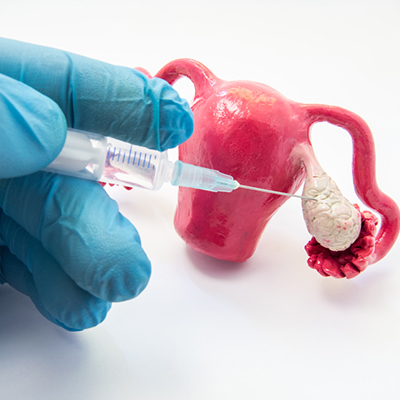Ovulation induction is a fertility treatment at Infertility Hospital in Karimnagar used to stimulate the ovaries to produce and release eggs. It is typically employed for individuals who have irregular or absent ovulation, a common cause of infertility. The process involves administering medications, such as clomiphene citrate or gonadotropins, which work by influencing the hormones that regulate egg development. Clomiphene is an oral medication that encourages the pituitary gland to release more follicle-stimulating hormone (FSH) and luteinizing hormone (LH), which in turn stimulate follicle growth in the ovaries. Gonadotropins are injectable medications that directly stimulate the ovaries to produce multiple follicles. The development of follicle is visualised and checked on through ultrasound scans and blood tests. Once the follicles are mature, an injection of human chorionic gonadotropin (hCG) is often given to trigger the final maturation and release of the egg(s). Ovulation usually occurs within 24-36 hours after the hCG injection, and timed intercourse or intrauterine insemination (IUI) is recommended around this time to increase the chances of conception. Ovulation induction is a valuable tool in assisted reproductive technology, helping many individuals overcome infertility related to ovulatory dysfunction as per Best Gynecologist in Karimnagar.

Stages of ovulation induction:
First, a baseline ultrasound is performed to check the ovaries and uterine lining. Then, fertility medications, such as clomiphene citrate or gonadotropins, are administered to stimulate follicle growth. Throughout this phase, follicular development is monitored with ultrasounds and blood tests to track hormone levels and follicle size. Once the follicles reach a mature size, an injection of human chorionic gonadotropin (hCG) is given to trigger ovulation. Ovulation usually occurs about 36 hours after the hCG injection. Timing intercourse or intrauterine insemination (IUI) is crucial at this point to coincide with egg release, maximizing the chances of conception.
How to prepare for ovulation induction:
Preparing for ovulation induction involves several key steps to maximize your chances of success and minimize discomfort. Firstly, ensure you have a thorough understanding of the process by discussing it in detail with your healthcare provider. Ask questions about the medications you'll be taking, their potential side effects, and the monitoring schedule. Secondly, prioritize a healthy lifestyle. This includes maintaining a balanced diet, engaging in regular moderate exercise, and getting enough sleep. Avoid smoking and excessive alcohol consumption, as these can negatively impact fertility. Thirdly, track your menstrual cycle closely, even before starting treatment, to help your doctor tailor the induction protocol to your needs. Finally, prepare for frequent appointments for ultrasounds and blood tests to monitor your response to the medication. Having support from your partner, friends, or family can also be incredibly helpful during this time.
To ensure optimum results after ovulation induction, a multi-faceted approach is crucial. Precise timing of intercourse or intrauterine insemination (IUI) based on ovulation monitoring (using ultrasound and blood tests) is paramount. Maintaining a healthy lifestyle, including a balanced diet, regular moderate exercise, and stress reduction techniques, can improve overall fertility. Following the instructions of Dr. Nayani Enjamoori at 9e Fertility for Best fertility Treatment in Karimnagar regarding medication dosages and timing is essential. Finally, consistent communication with your healthcare provider about any concerns or symptoms can help ensure timely intervention and optimize your chances of success.
